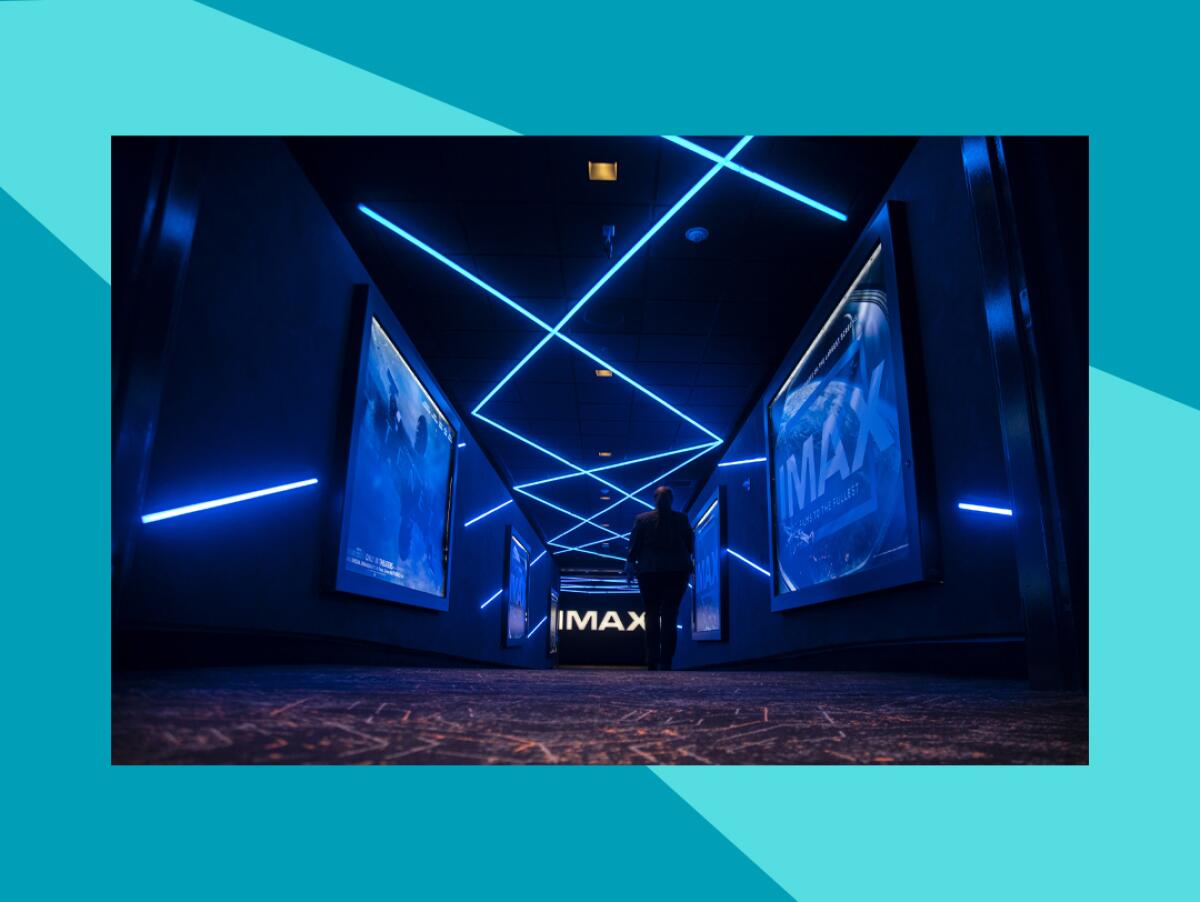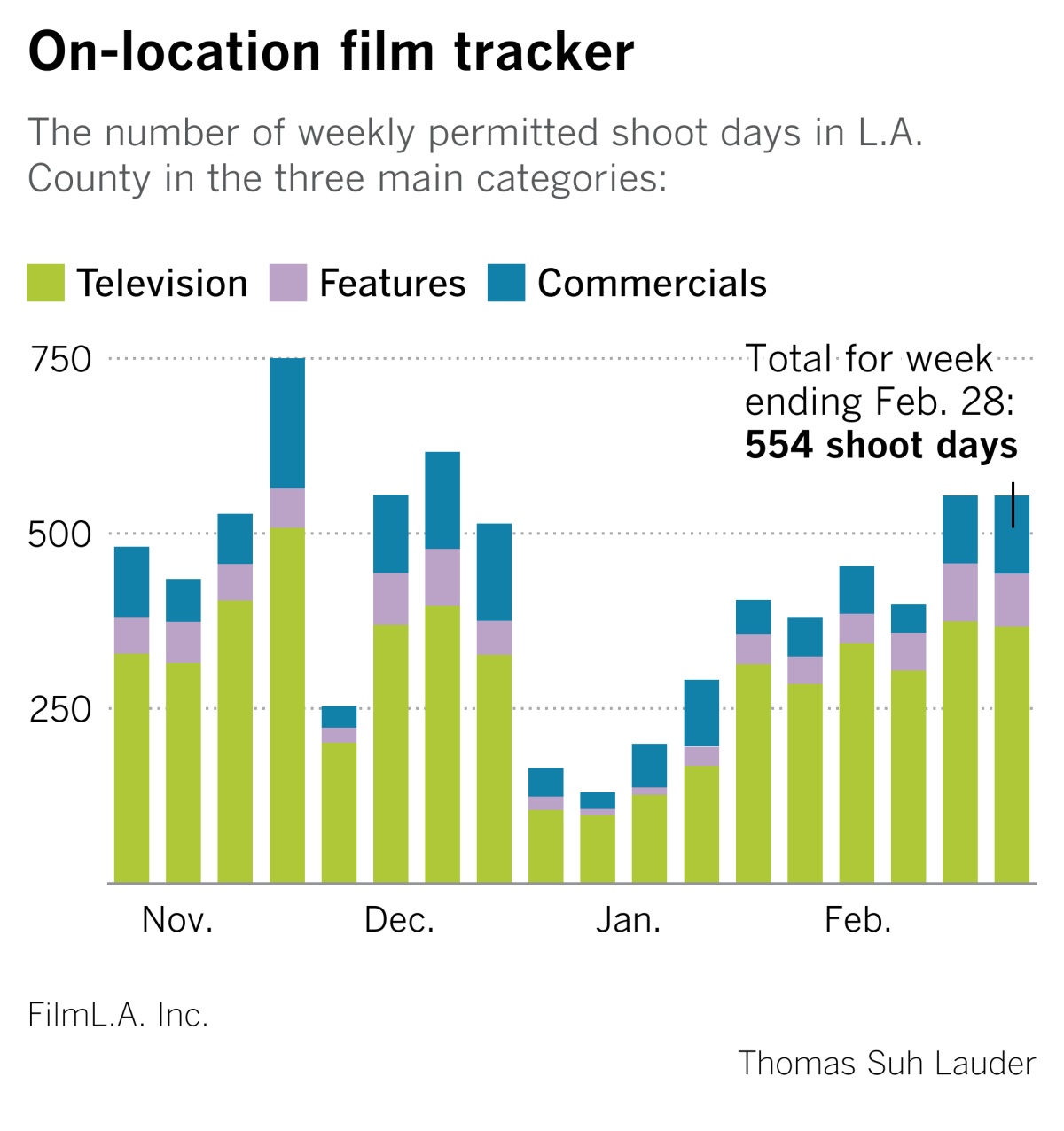Are summer blockbuster movies happening? Imax CEO has ‘no doubt’

- Share via
This is the March 2, 2021, edition of The Wide Shot, a weekly newsletter about everything happening in the business of entertainment. Sign up here to get it in your inbox.
Imax Corp. Chief Executive Richard Gelfond — who provides cinemas with some of the biggest screens out there — hasn’t been to the movies since the COVID-19 pandemic shuttered the film business nearly a year ago. But now that he’s vaccinated, the New York-based executive is planning his return as theaters there reopen.
“I’m starting to dream of re-experiencing movies very quickly,” he said by phone last week while on vacation in Puerto Rico.
New York City movie theaters can open Friday, with California counties expected to begin loosening their restrictions during the coming weeks as vaccination efforts pay dividends.
Though only 25% capacity is allowed at first, the development has increased confidence that cinemas will be more broadly open by or near the planned release dates of Walt Disney Studios’ ”Black Widow” (May 7) and Universal Pictures’ “F9” (May 28).
It feels strange to write this after everything that’s happened in the last year, but it’s looking increasingly likely that Hollywood will have something resembling a summer box-office season this year.
No, really.
As ever, there’s no guarantee release dates will stick as the pandemic drags on, and studios are closely watching what happens in Los Angeles, their biggest market. But depending on restrictions, it’s looking more realistic than it did a month ago that the movies will actually debut sometime close to their currently scheduled premieres.
Inside the business of entertainment
The Wide Shot brings you news, analysis and insights on everything from streaming wars to production — and what it all means for the future.
You may occasionally receive promotional content from the Los Angeles Times.
“The real question becomes, if theaters are open, will that occupancy restraint cause studios to still stay on the sidelines, or will they be willing to go forward,” said MKM Partners’ Eric Handler. “That’s sort of the next big hurdle to address. If you can be at 50%, I think studios are more than willing to give it a go. At 25%, it’s still an iffy proposition.”
While analysts espouse “cautious optimism” about the upcoming film slate — unbridled cheeriness went out of fashion a long time ago — Gelfond isn’t holding back.
“There’s no doubt in my mind we’ll have summer movies,” he said. “I think there’s been a lot of good signs recently.”
Moviegoers have heard the “welcome back” pitch before. Remember in August when Tom Cruise put out a video of himself in a mask watching Christopher Nolan’s “Tenet” on a big screen in London?

Still, the growing perception that the vaccine rollout is on the right track has greatly improved confidence. Over the weekend, the FDA approved Johnson & Johnson’s one-shot vaccine, clearing the way for shipments this week.
About 50% of moviegoers are “very or somewhat comfortable” going to a theater right now, according to recent polling by data firm NRG — close to the highest level since the start of the pandemic. In another sign of renewed optimism, a record 51% of respondents in the NRG poll said they think the pandemic is “getting better,” up significantly from January.
Cinemark Chief Executive Mark Zoradi last week cited the popularity of the chain’s “private watch parties” as a sign that “people are yearning for normality.” The circuit has hosted more than 150,000 of these private screenings to date, with an average of 13 attendees, he said during an earnings call. During the fourth quarter, the buy-out showings represented 24% of Cinemark’s attendance. A popular title was the Will Ferrell holiday classic “Elf.”
“This library content could be watched for free, at home, on the sofa. But, instead, consumers chose to pay $99 to see it in a theater,” Zoradi said.
Adding to the good feelings were the solid box-office returns of Warner Bros.’ “Tom & Jerry,” which generated $14.1 million domestically during its opening weekend, even though it was also streaming on HBO Max.
The surest sign of pent-up demand is the box office in countries where theaters are open and there are new movies that are worth seeing, including China, Japan and Australia, which fared better than the U.S. in controlling the virus’ spread.
Imax, which reports fourth-quarter earnings Thursday, received a boost from local hits in China, where it has more than 700 screens.
Last month, the Canadian film technology company boasted record opening weekend box office for the Chinese New Year when it took in $25 million thanks to the release of “Detective Chinatown 3,” up 45% from the same weekend in 2019 when the market was last open for the holiday. That film and the 2020 Chinese hit “The Eight Hundred” were both shot using Imax cameras.
As U.S. studios continued to delay their releases, Imax turned its focus to foreign fare. It marketed movies such as “Detective Chinatown 3” with live streaming events on social media apps including TikTok, where filmmakers made promotional appearances.
In Japan, the company benefited from the successful launch of the animated “Demon Slayer,” which set a box-office record there.
Imax Corp., which is headquartered outside of Toronto and operates in New York and Playa Vista, had to navigate California office safety protocols to digitally remaster foreign movies in time for their release dates amid office closures. The company also continued to expand its footprint by installing 23 new theaters in the third quarter of 2020 and signing new commitments with Chinese exhibitors, who’ve shown a growing preference for domestic films over Hollywood fare.
“I was probably one of the busier people in the movie business because we were open in so many places,” Gelfond said. “And because Hollywood was closed to blockbusters, we had to deal with local content in a lot of countries.”
While studios are bringing films to the living room sooner than usual, theatrical windows are not disappearing altogether.
Paramount Pictures last week told investors it would send movies including “A Quiet Place Part II” and “Mission: Impossible 7” to streaming service Paramount+ 45 days after they hit theaters. B. Riley analyst Eric Wold, in a recent note to clients, described Paramount’s decision as the latest sign that exclusive windows are here to stay.
The only studio to do away with the window is Warner Bros., but the company insists its day-and-date HBO Max release strategy is temporary.
Gelfond isn’t worried about shortening windows. His screens tend to play movies for a limited time before they start to show the next blockbuster. He said studios will want to maximize the box office of their shortened theatrical releases by putting their films in premium formats such as Imax.
“We’ve gotten more calls from both talent and directors where they’ve said, ‘You’ve become more important to us during these window changes, because I want this movie to stand out as really special and I don’t want it to get lost in all the clutter,’” Gelfond said.
Earnings have, of course, been dramatically lower than in 2019. Analysts on average expect Imax to report fourth-quarter revenues of $47 million, down 62% from a year earlier. Still, Imax’s stock has risen 40% in the last three months, according to FactSet, and roughly tripled since bottoming out in mid-March. Imax shares on Monday rose 4% to $21.44.
It’s not just Imax experiencing a Wall Street rebound. The largest theater chain and Reddit day-trader favorite AMC Entertainment more than doubled in the last three months amid its meme-stock roller coaster ride. Cinemark shares have gained nearly 50% in the same period of time.
Still, box-office attendance isn’t expected to return to actual normalcy until at least 2022. And this industry has been burned before by lofty expectations. There’s a difference between false hope and the real thing. These days, it’s hard to tell the difference.
The Golden Globes happened

It was a good night for streaming services at the 78th Golden Globe Awards, with Netflix winning 10 trophies and Amazon, Hulu (owned by Disney) and Apple TV+ taking home statuettes.
Sure, some of the streaming winners would’ve been studio releases if not for the pandemic. “The Trial of the Chicago 7” was a Paramount movie before it was turned over to Netflix, which Aaron Sorkin said “saved our lives” while accepting the award for screenplay. “Borat Subsequent Moviefilm” was set up for distribution at Universal Pictures before Amazon acquired it.
Also, it’s important to note that the night’s top film prize, best drama, went to “Nomadland,” a Searchlight movie (also Disney-owned).
Beyond streaming, some little-seen movies were recognized, including STX’s “The Mauritanian,” “Judas and the Black Messiah” and “Minari,” which would be good for those films if more people had watched the ceremony. As Stephen Battaglio wrote, the ratings were dismal. The program fell to 5.4 million viewers on NBC, “the smallest audience since the event moved to the network in 1996,” according to preliminary Nielsen data.
The Hollywood Foreign Press Assn. leadership briefly addressed its lack of Black members in a 43-second address. But the show did not address the allegations of self-dealing and ethical lapses that were the focus of the Los Angeles Times’ recent investigation.
Read our full Globes coverage here.
Number of the week

Services such as Spotify and Apple Music drove a 9.2% increase in recorded music revenues in 2020, which hit $12.2 billion in the U.S., according to annual numbers from the Recording Industry Assn. of America. Streaming revenues grew 13.4% to pass the $10-billion mark for the first time.
It’s hard to overstate how much streaming has come to dominate the music business. Check out this chart from the RIAA, showing 83% of last year’s sales coming from the services, mostly driven by subscriptions.
Some other interesting takeaways:
- The number of U.S. paid music subscriptions jumped 25% to 75.5 million in 2020.
- Vinyl record sales grew 28.7% to $626 million, surpassing CDs for the first time since 1986. CD revenues fell 23% to $483 million.
- Full service paid subscriptions were the biggest streaming category, growing 14.6% to $7.0 billion.
- “Limited tier paid subscriptions” (services including Pandora Plus, Amazon and fitness apps like Peloton) rose 13.4% to $724 million.
What we wrote
— AT&T is spinning off its troubled satellite TV unit DirecTV as a new company with private equity giant TPG Capital, Meg James reported. AT&T will own 70% of the new entity, and TPG will pay $1.8 billion for its 30% stake. The venture will be valued at $16.25 billion, including debt, a fraction of the $49 billion AT&T paid six years ago for the El Segundo satellite TV giant.
— Why are people spending hours on Clubhouse? It’s not (usually) the money. Sam Dean wrote a fascinating story that dug into the scams on the tech world’s hottest new virtual hangout and the reasons for the audio app’s exploding popularity.
— What did the WGA learn from its protracted battle with agencies? Anousha Sakoui’s Q&A with David Goodman.
— Randall Roberts on what really happened when federal officers persecuted Billie Holiday
— How inclusive are Netflix shows and movies? Netflix commissioned a two-year study of its progress on inclusion on and off camera from USC’s Annenberg Inclusion Initiative, and it’s a mixed review. The company pledged $100 million over five years to groups and initiatives focused on issues of diversity and inclusion. Further reading: On Monday, we broke the news of Netflix’s new fellowship with Ghetto Film School for documentary and non-scripted filmmakers.
Hollywood production
This marks the second week in a row during which the Los Angeles area clocked 554 shoot days as the local production business recovers from shutdowns, according to FilmLA Inc. The mix of production shifted slightly, with more commercial shoots during the week that ended Sunday.

More top stories
How Hollywood is beating its final boss: video game adaptations (The Ringer). Facebook ad campaign promotes personalized advertising (Wall Street Journal). Talking to the film critic who (maybe) inspired “Malcolm & Marie” (Vulture). The pandemic brings a brutal hit to the awards-season economy: “I’m basically living off savings right now” (THR). Extremely loud and incredibly close: An inside look at the new era of music documentaries (EW). Black News Channel looks to shake up cable-TV news landscape (WSJ).
Important long read from the Atlantic: 5 Pandemic Mistakes We Keep Repeating.
On the calendar
— Awards season grinds on, with voting for Oscar nominations beginning Friday, Critics Choice Awards on Sunday and PGA noms out Monday.
— Paramount+ launches Thursday. Speaking of which, I hope whoever came up with phrase “a mountain of content” for ViacomCBS’ investor presentation got royalties or something. Further reading: How Paramount+ plans to scale the streaming mountain.
Finally... stay positive
The Hold Steady’s album “Stay Positive” kind of got me through 2008. If you’re not familiar with these Brooklyn rockers, think of AC/DC and the E Street Band with a bellowing beat poet for a lead singer. Their new studio album, “Open Door Policy,” is full of joyous bar-rock (Spotify. Apple Music. Bandcamp.). Here’s a taste:

Inside the business of entertainment
The Wide Shot brings you news, analysis and insights on everything from streaming wars to production — and what it all means for the future.
You may occasionally receive promotional content from the Los Angeles Times.




